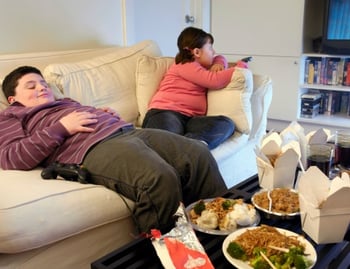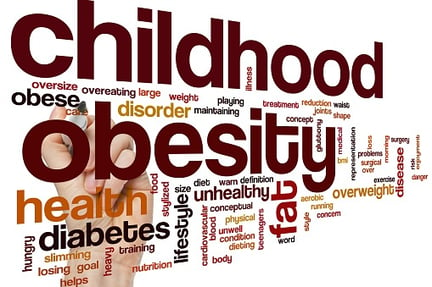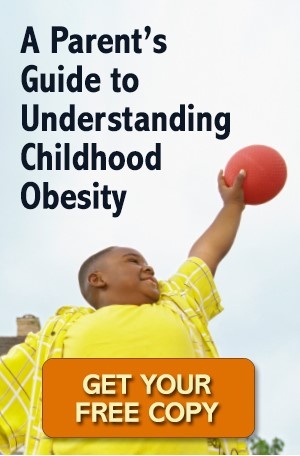 Obesity. A stigma-soaked word for many. Every parent wants healthy children who love themselves, who have the best opportunities life can offer them. Childhood obesity can feel like a thunderstorm on the parade of life. One might even forget it’s not always a choice, sometimes it’s a disease. Sometimes it’s even a symptom of a disease.
Obesity. A stigma-soaked word for many. Every parent wants healthy children who love themselves, who have the best opportunities life can offer them. Childhood obesity can feel like a thunderstorm on the parade of life. One might even forget it’s not always a choice, sometimes it’s a disease. Sometimes it’s even a symptom of a disease.
When you have a culture like ours where playing outside has been traded for relaxing indoors with video games and TV, it can be difficult to decipher which one your child is suffering from. It can be tumultuous attempting to understand core causes, unique challenges children who are obese face, and ultimately the consequences if the issue is not addressed and handled appropriately.
Defining Obesity in Children
According to the Mayo Clinic, over 3 million new cases of obesity are diagnosed each year. Obesity in children can be even more difficult to diagnose due to how it’s defined: in terms of percentile rather than set standards as it’s determined in adults.
Doctors use two supporting standards to diagnose obesity: Body Mass Index (BMI) and percentile – reported weights of children all around the nation create an average, or a sliding scale termed “percentile.”
The BMI is relative to the percentile of children the same age and gender. As stated by the Center for Disease Control, a child with BMI at or above the 85th to 94th percentile of children at the same age and of the same gender is considered overweight. A child at or above the 95th percentile is considered obese.
Causes of Childhood Obesity
Childhood obesity can be a product of a medical issue, lifestyle, and/or genetics. It’s crucial to work with a healthcare provider to determine which lead to a specific child’s obesity. It can be a sensitive topic to tackle, but the sooner a cause is identified, the sooner a treatment plan can be enacted.
Medical Causes:
According to the article Thyroid and Obesity: An Intriguing Relationship by the Journal of Clinical Endocrinology & Metabolism, there's a direct correlation between an inactive thyroid and obesity in both children and adults. In fact, thyroid hormone levels considered within a normal range, but on extreme ends of the normal range spectrum, typically go hand in hand with obesity. A simple blood test can reveal thyroid-stimulating hormone and free thyroxine levels, both indicative of thyroid function.
Cushing’s Syndrome and Disease can both cause obesity in children. Cushing’s is a steady influx of the hormone cortisol in the body. Cortisol comes from the adrenal glands, but the pituitary gland can tell the adrenal glands to make cortisol. This is why there are two different types of Cushing’s: if the excess cortisol is caused by the pituitary gland it is called Cushing’s Disease.
If the excess cortisol is caused by an issue with the adrenal glands it is called Cushing’s Syndrome. The trademark of Cushing’s is a round face and trunk with thinner arms and legs.
Children with Cushing’s tend to have a slow growth rate in addition to obesity. There are multiple tests available to determine whether or not a person has Cushing’s, however each test is different in the source it attempts to identify. You may need to take several tests including blood draws and urine samples before your healthcare provider is able to assess a likely culprit.
Medications like corticosteroids, antidepressants, and even some seizure medications can aid in causing obesity or negatively influence a pre-existing weight problem according to the National Heart, Lung, and Blood Institute. Talk with your doctor about what medications can impact weight, and how to proceed if the child has taken them.
 Lifestyle:
Lifestyle:
The habits we as people form have an impact on our overall health. Lifestyle is a factor when assessing childhood obesity. While inactivity is a contributor to weight gain, it is not the only one. As per the American Heart Association, poor portion control, eating food lacking in valuable nutrients, and eating out more can attribute to obesity. Generally speaking, meals and snacks from fast food restaurants, bags (like potato chips), and frozen fried foods are not the optimal choice of nutrition for a child who is hungry.
Genetics:
It’s likely that genetics play a role in whether or not a person becomes obese. It sounds unfair, and that’s because it is. According to an article in the Oxford Journal’s Human Molecular Genetics Periodical, heritability estimates for obesity are comparable to schizophrenia. Meaning a person who came from obese parents is almost as likely to be obese as a person who came from schizophrenic parents is likely to be schizophrenic.
Unique Challenges
Unique challenges for childhood obesity come in a number of forms, and vary child to child. The list of considerations grows year by year. That being said, there are a few managing to stand out from the rest by proving to be exceedingly difficult.
Identifying the cause
A child’s weight can be a product of many things ranging from health issues to genetics to lifestyle (as noted above). It can be difficult to identify exactly why a child is obese. This is why it is crucial to work with your healthcare provider in determining a plan of attack. If there are additional symptoms, request labs, bloodwork, and additional testing if necessary. If underlying health issues are ruled out, you'll find the treatment for genetic and lifestyle obesity are one in the same: proper diet and nutrition, and exercise. This is also known as energy balance.
Commitment
Sticking to a lifestyle change is an adjustment requiring a great deal of discipline in the beginning, something children can really struggle with. It’s important to note the simple fact that long-lasting changes don’t happen overnight. They can be tackled one by one with baby steps to build a strong foundation of a new way of life.
Psychological effects
An article published in the Official Journal of American Academy of Pediatrics delves into the behavioral health of children who are overweight or obese. It starts by talking about the negative traits children tend to see in overweight or obese people…laziness and sloppiness. This not only affects how other children view obese children, it carries massive ramifications on how obese children view themselves. The lasting consequences of these extensive, yet under-researched implications present a wealth of deep-rooted psychological issues including intense drop in self-esteem, low confidence, and the lack of motivation to achieve.

Consequences
Consequences of childhood obesity are far-reaching and range from short term to long term. The following is a list from the Center for Disease Control of health issues that are most likely to arise (and additional subsequent explanations):
- Sleep Apnea: irregularity in respiration during sleep presenting as pauses in breathing, and/or short breaths.
- Asthma: a condition in which a person’s airways become inflamed, swollen, and narrowed with excess mucus production. This causes difficulty in breathing.
- High Blood Pressure: the force of your blood pushing against your arterial walls is too high on a regular basis, causing weakened arterial walls.
- High Cholesterol: an excess amount of fat in your blood stream. This can lead to fat sticking to the arterial walls, building up over time, and creating a blockage to hinder or prevent blood flow.
- Premature Heart Problems: early on-set of heart disease.
- Increased Risk for Type 2 Diabetes: a condition that negatively affects the way glucose is processed and used in the body. It is a lifelong condition requiring drastic changes in lifestyle.
- Fatty Liver Disease: an excessive buildup of fat in the liver that may result in liver failure.
- Gallstones: hard stones found in the gallbladder that can impair the ability of your body to digest food.
- Heartburn: a symptom of acid reflux. Can damage the esophagus.
- Damaged Joints and Subsequent Pain
- Anxiety and Depression
- Lower Self-Reported Quality of Life
While it's a health hazard, childhood obesity is not the end all be all. There is treatment, guidance, and monitoring available to ensure an obese child not only improves their health but their other organs remain functional during the road to recovery.
If you suspect your child may be obese, there is help, there is hope, and it’s never too late to take steps towards a healthier lifestyle for your child.
It starts with you, and you are not alone.
We have doctors who can help you at Orchard Hospital’s Medical Specialty Center—Your Everyday Health Care Clinic—offering walk-in care or appointments.
![]() Our mission at Orchard Hospital is to provide our community with superior health care. We strive to ensure that your experience at Orchard Hospital is as pleasant and comfortable as possible. Our priority is to provide you with the care you need when you need it, with skill, compassion, and respect.
Our mission at Orchard Hospital is to provide our community with superior health care. We strive to ensure that your experience at Orchard Hospital is as pleasant and comfortable as possible. Our priority is to provide you with the care you need when you need it, with skill, compassion, and respect.



